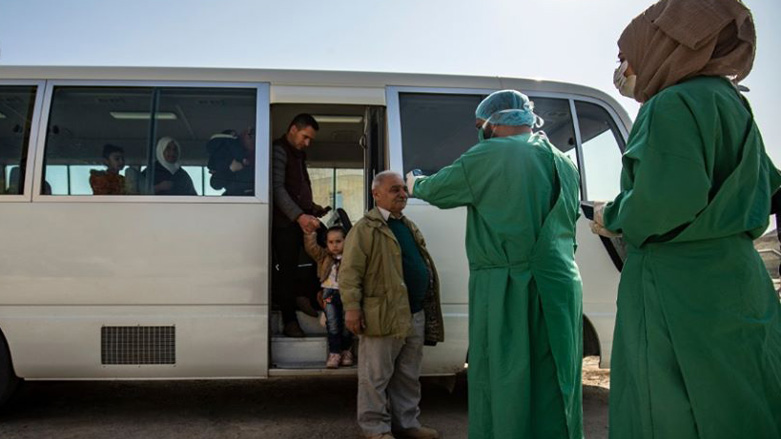Officials to close Syria-Kurdistan Region border to block coronavirus
The Semalka border crossing between the Kurdistan Region and Syrian Kurdistan (Rojava) will be temporarily closed on Sunday as an emergency measure to prevent the spread of the coronavirus, local authorities in northeastern Syria announced on Thursday.

ERBIL (Kurdistan 24) – The main border crossing between the Kurdistan Region and Syrian Kurdistan (Rojava) will be temporarily closed on Sunday as an emergency measure to prevent the spread of the coronavirus, local authorities in northeastern Syria announced on Thursday.
“The Semalka border crossing with the Kurdistan Region will be completely closed from 1 March until further notice,” read a public statement by the Kurdish-led Executive Council of North and East Syria.
This decision was made by local officials as “a precautionary measure to prevent the transmission of the coronavirus to the areas of autonomous administration of North and East Syria, excluding emergency cases.”
Although there have been no reported cases yet in the Kurdistan Region, seven known individuals have tested positive for the disease in other parts of Iraq, including the first case identified on Thursday in the capital of Baghdad.
Read More: Iraq confirms first case of coronavirus in Baghdad; sixth nationwide
Local authorities in northeast Syria deployed medical inspection teams to points at the border earlier in the week.

Thursday’s statement continued by explaining that, on Saturday and Sunday, those with foreign residencies who are currently residing in northeastern Syria will be allowed to leave and those from northeastern Syria who visited the Kurdistan Region for humanitarian reasons will be allowed to return. Only cancer patients heading to the Kurdistan Region for treatment will be allowed to use the Semalka crossing to enter.
The precautionary measure will also restrict humanitarian aid workers and foreign journalists from traveling into northeastern Syria from the Kurdistan Region.
According to the latest figures by the World Health Organization (WHO), the contagious COVID-19, as WHO refers to the virus, has so far infected over 83,000 and killed over 2,800 in 50 countries worldwide. Chinese health authorities first became aware of the illness in late December in the seaside city of Wuhan.
The Kurdistan Regional Government (KRG) has strengthened its own regulations at border-crossings and airports to establish effective medical inspection points to prevent those who carry the virus from entry.
The KRG also announced that, starting Wednesday, all schools and colleges, both public and private, will be shut down by government order until March 10, the start of Newroz, the Kurdish new year, which continues until March 23.
Local authorities in Sulaimani and Erbil have also canceled Newroz spring festivals on March 21 as well as all public events and celebrations which draw crowds of thousands, often in close proximity.
Read More: Kurdistan bolsters coronavirus precautions; Newroz celebrations suspended
The KRG Council of Ministers also voted to suspend “unnecessary travel” within the Kurdistan Region and block entry from Iraq until further notice.
Both the Kurdistan Region and the Iraqi federal government have blocked travel to and from Iran, where the most regional cases have been reported and where all known cases in Iraq are thought to have originated.
Read More: Coronavirus appears to be spreading among Iranian elite: report
Local officials in the Kurdistan Region have also banned the popular pastime of smoking of hookahs (also known as shishas) in public cafes.
Editing by John J. Catherine